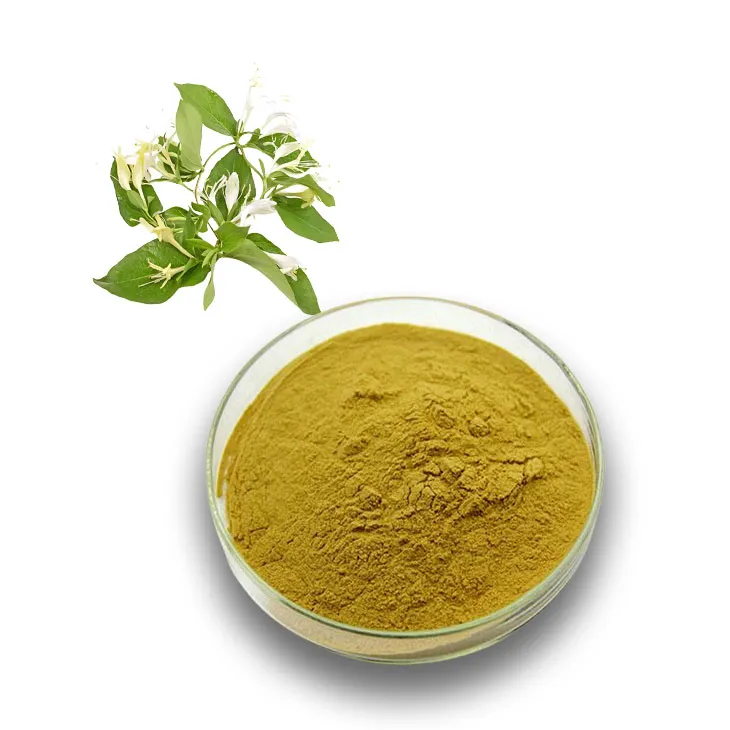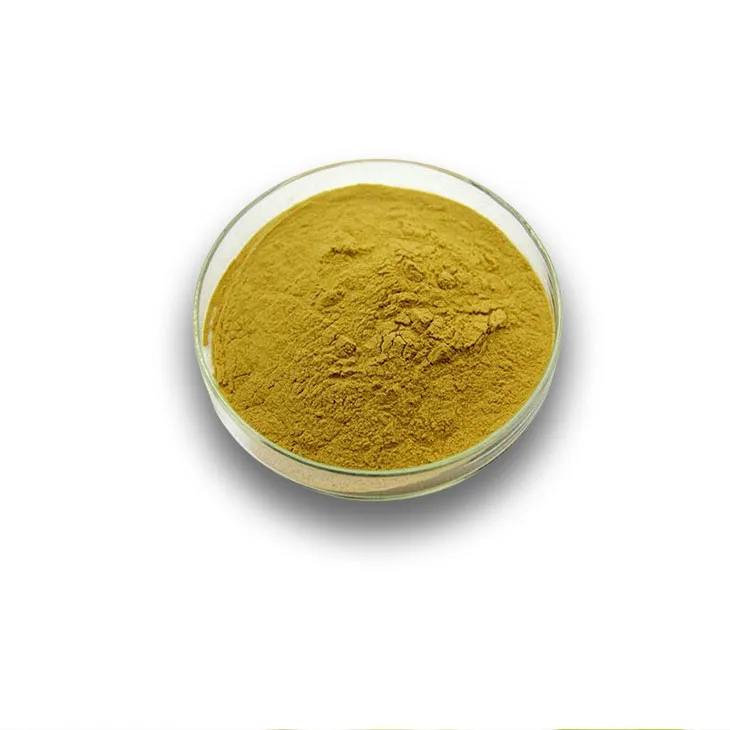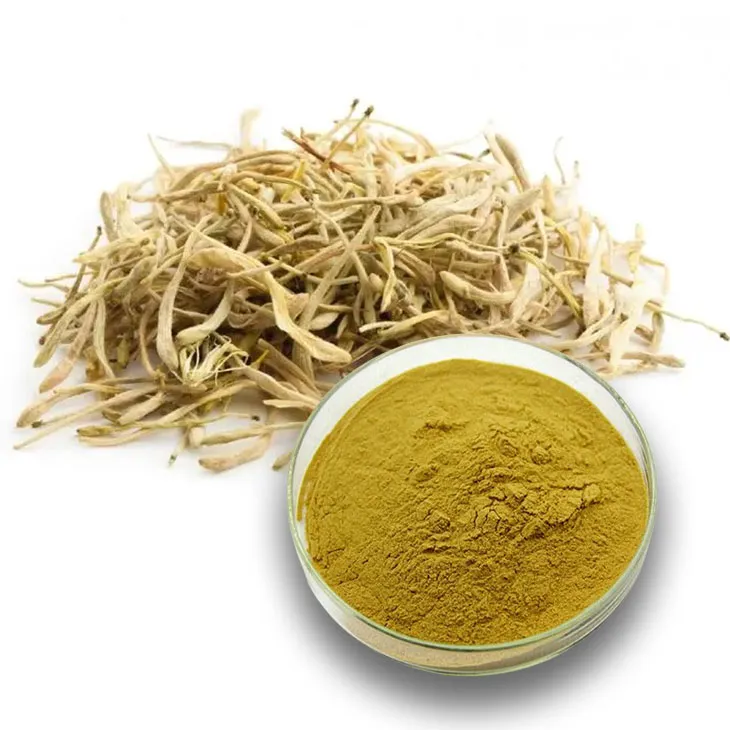- 0086-571-85302990
- sales@greenskybio.com
How does honeysuckle pollen appeal to health - conscious consumers?
2024-12-14

Introduction
In recent years, the health - conscious consumer market has been growing exponentially. People are becoming more aware of the importance of maintaining good health through natural products. Honeysuckle Pollen, a relatively under - explored natural substance, has a great deal of potential in this regard. It is rich in a variety of nutrients and bioactive compounds that can offer numerous health benefits. This article will explore how Honeysuckle Pollen can appeal to health - conscious consumers.

Nutritional Value of Honeysuckle Pollen
Honeysuckle pollen is a nutrient - dense product. It contains a significant amount of proteins, which are essential for building and repairing tissues in the body. These proteins are also a source of energy when needed.
It is rich in vitamins, such as vitamin C, which is well - known for its role in boosting the immune system. Vitamin C also acts as an antioxidant, protecting cells from damage caused by free radicals. Additionally, honeysuckle pollen contains B - vitamins like niacin, riboflavin, and thiamine, which are involved in various metabolic processes in the body.
Minerals are another important component of honeysuckle pollen. It contains potassium, which is crucial for maintaining proper heart function and regulating blood pressure. Calcium, which is essential for strong bones and teeth, is also present. Magnesium, involved in over 300 enzymatic reactions in the body, is yet another mineral found in honeysuckle pollen.

Health Benefits of Honeysuckle Pollen
Antioxidant Properties
One of the most significant health benefits of honeysuckle pollen is its antioxidant activity. Free radicals are unstable molecules that can cause damage to cells, leading to various health problems such as aging, cancer, and heart disease. The antioxidants present in honeysuckle pollen, such as flavonoids and phenolic compounds, can neutralize these free radicals. By doing so, they help protect the body's cells from oxidative stress and reduce the risk of developing chronic diseases.
Anti - Inflammatory Effects
Honeysuckle pollen also exhibits anti - inflammatory properties. Inflammation is a natural response of the body to injury or infection, but chronic inflammation can be harmful. The bioactive compounds in honeysuckle pollen can help reduce inflammation in the body. This can be beneficial for people with inflammatory conditions such as arthritis, where reducing inflammation can relieve pain and improve joint function.
Immune - Boosting Capabilities
As mentioned earlier, the presence of vitamin C and other immune - enhancing components in honeysuckle pollen makes it a great natural immune booster. A strong immune system is essential for fighting off infections and diseases. Consuming honeysuckle pollen can help the body's immune system function optimally, reducing the frequency and severity of illnesses.

Forms of Honeysuckle Pollen for Consumption
Dietary Supplements
One of the most common forms in which honeysuckle pollen is available for health - conscious consumers is as a dietary supplement. These supplements are often in the form of capsules or tablets. They are convenient for people who want to ensure they are getting a consistent dose of the pollen's nutrients. Manufacturers can package the supplements in a way that is easy to store and transport, making them accessible for consumers on the go.
Added to Healthy Foods
Honeysuckle pollen can also be added to various healthy foods. For example, it can be incorporated into granola bars, providing an extra nutritional boost. It can also be added to smoothies, where it can blend well with fruits and vegetables. Another option is to include it in yogurt, creating a more nutrient - rich and flavorful product. By adding honeysuckle pollen to these common healthy foods, it becomes more accessible to a wider range of consumers who may not be inclined to take supplements.

Marketing Strategies for Honeysuckle Pollen
Highlighting Purity
For health - conscious consumers, the purity of a product is of utmost importance. When marketing honeysuckle pollen, it is crucial to emphasize that it is pure and free from contaminants. This can be achieved through strict quality control measures during production and packaging. For example, manufacturers can provide information about their sourcing methods, ensuring that the pollen is collected from clean and unpolluted areas. They can also mention any testing procedures they undertake to verify the purity of the product.
Emphasizing Natural Origin
Health - conscious consumers are often drawn to natural products. Honeysuckle pollen, being a natural product, should have its natural origin highlighted in marketing. This can include information about the honeysuckle plant itself, such as where it grows and how the pollen is harvested. Marketers can use images of the honeysuckle plant in bloom to create an association with nature in the minds of consumers. Additionally, they can mention the traditional uses of honeysuckle in different cultures, further emphasizing its natural and time - tested qualities.
Educating Consumers
Many consumers may not be fully aware of the benefits of honeysuckle pollen. Therefore, an important marketing strategy is to educate consumers about its nutritional value and health benefits. This can be done through various means such as creating informative brochures, having an educational section on the product's website, or even conducting seminars or webinars. By providing accurate and detailed information, consumers will be more likely to consider incorporating honeysuckle pollen into their health regimens.
Conclusion
Honeysuckle pollen has a great deal of potential to appeal to health - conscious consumers. Its rich nutritional value, diverse health benefits, and the ability to be presented in various forms make it a viable option for those looking to improve their health through natural products. However, effective marketing strategies that highlight its purity, natural origin, and educate consumers about its benefits are essential to fully realize its market potential. With the right approach, honeysuckle pollen can become a popular choice among health - conscious consumers in the future.
FAQ:
What are the main nutritional components in honeysuckle pollen?
Honeysuckle pollen contains a variety of nutrients. It is rich in proteins, which are essential for building and repairing body tissues. It also contains vitamins such as vitamin C, which is important for immune function, and vitamin E, an antioxidant. Additionally, it has minerals like zinc and iron, which play crucial roles in various physiological processes in the body.
How do the antioxidant properties of honeysuckle pollen benefit health - conscious consumers?
For health - conscious consumers, the antioxidant properties of honeysuckle pollen are highly appealing. Antioxidants help to neutralize free radicals in the body. Free radicals are unstable molecules that can cause damage to cells, leading to various health problems such as aging, heart disease, and cancer. By consuming honeysuckle pollen with antioxidant properties, consumers can potentially reduce the risk of these diseases and support overall health.
Can honeysuckle pollen be used as a natural anti - inflammatory agent? How?
Yes, honeysuckle pollen can be used as a natural anti - inflammatory agent. It contains certain bioactive compounds that have anti - inflammatory effects. These compounds can help to reduce inflammation in the body by inhibiting the production of inflammatory mediators. For example, it may be beneficial for those with conditions like arthritis or inflammatory bowel disease, providing a natural alternative to synthetic anti - inflammatory drugs for health - conscious individuals who prefer natural remedies.
What are the different forms in which honeysuckle pollen can be presented to consumers?
Honeysuckle pollen can be presented in several forms. One common form is as a dietary supplement, usually in the form of capsules or tablets. This makes it convenient for consumers to incorporate into their daily routine. It can also be added to healthy foods, such as smoothies, energy bars, or granola. Another form could be as a powder that can be used in baking or cooking, allowing consumers to enjoy its benefits while consuming their favorite foods in a healthier way.
How important is highlighting the purity and natural origin in marketing honeysuckle pollen to health - conscious consumers?
Highlighting the purity and natural origin of honeysuckle pollen is extremely important when marketing to health - conscious consumers. These consumers are often very concerned about the quality and source of the products they consume. They prefer products that are free from additives, pesticides, and other contaminants. By emphasizing its purity and natural origin, it builds trust and confidence in the product, making it more appealing to this target group.
Related literature
- The Nutritional and Health - Promoting Properties of Honeysuckle Pollen"
- "Honeysuckle Pollen: A Natural Source of Health Benefits"
- "Marketing Natural Health Products: The Case of Honeysuckle Pollen"
- ▶ Hesperidin
- ▶ Citrus Bioflavonoids
- ▶ Plant Extract
- ▶ lycopene
- ▶ Diosmin
- ▶ Grape seed extract
- ▶ Sea buckthorn Juice Powder
- ▶ Fruit Juice Powder
- ▶ Hops Extract
- ▶ Artichoke Extract
- ▶ Mushroom extract
- ▶ Astaxanthin
- ▶ Green Tea Extract
- ▶ Curcumin
- ▶ Horse Chestnut Extract
- ▶ Other Product
- ▶ Boswellia Serrata Extract
- ▶ Resveratrol
- ▶ Marigold Extract
- ▶ Grape Leaf Extract
- ▶ New Product
- ▶ Aminolevulinic acid
- ▶ Cranberry Extract
- ▶ Red Yeast Rice
- ▶ Red Wine Extract
-
Tongkat Ali Extract
2024-12-14
-
Fenugreek Extract Powder
2024-12-14
-
Hedyotis Diffusa Extract
2024-12-14
-
Clove Powder
2024-12-14
-
Feverfew Extract
2024-12-14
-
Sophora Flavescens Root Extract
2024-12-14
-
Kelp Extract Powder
2024-12-14
-
Thunder God Vine Extract
2024-12-14
-
Oat Straw Extract Powder
2024-12-14
-
Lotus leaf extract
2024-12-14





















